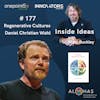Patterns of Connection & The systems View of Life, with Fritjof Capra
Dr. Fritjof Capra is my guest on Episode 139 of Inside Ideas with Marc Buckley.
Fritjof is a scientist, educator, activist, and author of many international bestsellers that connect conceptual changes in science with broader changes in worldview and values in society.
A Vienna-born physicist and systems theorist, Fritjof first became popularly known for his book, The Tao of Physics, which explored the ways in which modern physics was changing our worldview from a mechanistic to a holistic and ecological one. Published in 1975, it is still in print in more than 40 editions worldwide and is referenced with the statue of Shiva in the courtyard of one of the world’s largest and most respected centers for scientific research: CERN, the Center for Research in Particle Physics in Geneva.
Over the past 50 years, Fritjof has been engaged in a systematic exploration of how other sciences and society are ushering in a similar shift in worldview, or paradigms, leading to a new vision of reality and a new understanding of the social implications of this cultural transformation.
His most recent book, Patterns of Connection: Essential Essays from Five Decades (The University of New Mexico Press, 2021),
Capra is a founding director of the Berkeley-based Center for Ecoliteracy, which is dedicated to advancing ecology and systems thinking in primary and secondary education, and serves on the Council of the Earth Charter Initiative.
He is the author of The Turning Point (1982), The Web of Life (1996), The Hidden Connections (2002), The Science of Leonardo (2007), and Learning from Leonardo (2013). He coauthored Green Politics (1984), Belonging to the Universe (1991), and EcoManagement (1993), and coedited Steering Business Toward Sustainability (1995).
The main focus of Fritjof's environmental education and activism has been to help build and nurture sustainable communities. He believes that to do so, we can learn valuable lessons from the study of ecosystems, which are sustainable communities of plants, animals, and microorganisms.
The Systems View of Life presents a grand new synthesis of this work—integrating the biological, cognitive, social, and ecological dimensions of life into one unified vision. Several critics have suggested that The Systems View of Life, which Fritjof coauthored with Pier Luigi Luisi, Professor of Biology at the University of Rome, is destined to become another classic.
Thanks for letting us all Inside your Ideas!












